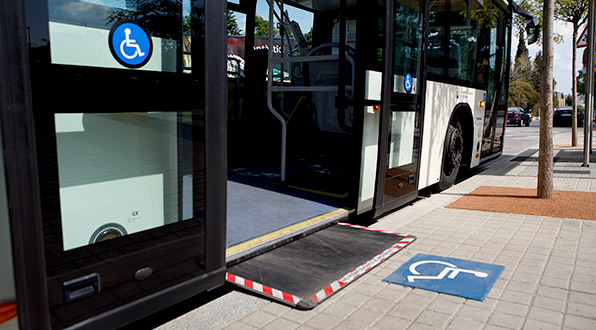Accessibility at TMB
We have made it our commitment to ensure that everyone can use the TMB network safely, comfortably and under equal conditions.
We believe in universal accessibility.
Accessibility is a quality factor that guarantees the universal right to mobility. Additionally, it is an opportunity to improve the travel conditions for all people, regardless of their physical, cognitive, sensory, or communication abilities.
From an accessibility perspective, the following should be taken into account:
- Everyone, regardless of their abilities, should be able to use different modes of transportation.
- Everyone, regardless of their language, culture, or abilities, should have access to information and communication across any transportation network.
- Public transportation should offer comfort and confidence to citizens to motivate them to use it, regardless of their personal characteristics.
At TMB, accessibility becomes a driving force for change to improve the quality of mobility services by proposing solutions with a design for everyone.
Is not about designing the experience,
but about designing for experience.
Universal Accessibility Master Plan
There are two key moments that mark the beginning of a social transformation and, consequently, of a public transport system adapted to the needs of all citizens in Catalonia, and specifically in the city of Barcelona.
In 1991, the first Accessibility Law was passed by the Parliament of Catalonia, and in 1992, the first Paralympic Games were held in the city. These two milestones in the history of accessibility in Barcelona represented, for TMB, a new path toward universal accessibility.
In that same year, 1992, with the city committed to hosting the Paralympic Games in the same facilities as the Olympic Games—including the Olympic Village—TMB made a firm commitment to accessibility and to ensuring that everyone could travel using public transport. To achieve this goal, it began implementing changes across its transport networks, starting with the launch of the first adapted bus lines using low-floor vehicles equipped with ramps.
This marked the beginning of a journey, with the next major milestone arriving in 2010, when a collaborative effort with the main organizations representing people with disabilities led to the development of TMB's Universal Accessibility Master Plan.
All the principles guiding TMB's accessibility efforts are encompassed in the Universal Accessibility Master Plan, which shares a common goal: to manage and adapt our services and infrastructure in order to eliminate all barriers and work to improve accessibility across our transport networks.
The seven principles that underpin TMB’s accessibility policy are:
- Universal accessibility and design for all;
- Shared responsibility throughout the accessibility chain;
- Participation of involved groups;
- Integration, independent living, and reduction of substitute measures;
- Internal cross-functionality;
- Anticipation, proactivity, and innovation;
- Leadership and sharing of expertise.
- ¿Quieres que lo adapte también a un tono más formal, institucional o está bien así?
Accessibility management in TMB
Thanks to the Universal Accessibility Master Plan, TMB has implemented a new model for managing diversity and has created a new service aimed at addressing accessibility across the entire company from a technical, cross-cutting, and integrated perspective. This approach is structured around several strategic lines: the internalization of a team of professionals specialized in the field, the design and implementation of a tailored management system, the creation and promotion of a participatory space with stakeholders, and a strong commitment to innovation.
The Operational Code as a management system
In 2018, in line with the guidelines set out in TMB’s Universal Accessibility Master Plan, the Operational Code was create as an internal management system with a cross-organizational vision, composed of 15 working groups. This structure enables the organization to meet challenges and carry out projects aimed at the continuous improvement of accessibility in TMB’s vehicles, infrastructure, and services as a public transport operator.
The Operational Code allows the organization to comply with the Catalonia Accessibility Code, which requires an accessibility management system.
This management system enables TMB to:
- Comply with regional, national, and European regulations;
- Strive for excellence in accessibility;
- Integrate accessibility from the outset, for everyone.
Main accessibility projects at TMB
We are working on a range of projects in several areas of accessibility:
- Accessibility Manual for the Ideal Bus Stop: A guide describing the accessibility requirements that different types of bus stops must meet in urban spaces.
- Improvement of the Habitability of Bus Interior Spaces: A study on the accessible features that the interior spaces and elements of vehicles must fulfill. In collaboration with COCEMFE.
- Proposal to Amend Regulation No. 107 on Vehicle Construction: A proposal to improve accessibility features and ensure clear interpretation by manufacturers, submitted to the United Nations Economic Commission for Europe in collaboration with other countries and European institutions.
- Accessibility in New Trains and Refurbishment of the Existing Metro Fleet: Adaptations carried out according to national and regional regulations, requiring improvements based on knowledge of the profiles of metro users with disabilities. This initiative was awarded the Zero Project 2022 and is the result of collaboration between the Municipal Institute for People with Disabilities (IMPD), Alstom, and TMB.
- New Metro Network Map: A simplified design that improves readability and overall comprehension.
- Absolute Priority Elevator Signage: Signage implemented throughout the metro network to give priority to people with reduced mobility.
- Amendment of the Public Transport Passenger Regulations in the AMB Area: At the request of TMB, modifications were introduced to regulate ramp access for walkers, mobility scooters, and positioning chairs, as well as to reinforce the priority use of reserved spaces and seats on board buses.
- Training and Awareness Programs: Initiatives to educate and raise awareness among all TMB staff on diversity and customer service for people with disabilities.
- TMB Accessibility Plan: Based on an assessment of the current situation, this plan establishes a roadmap for improving accessibility in the metro and bus networks, as well as across all transversal areas of TMB. It includes a timeline of actions and an associated budget for each one.


















